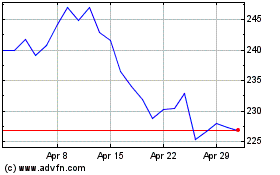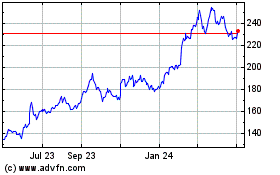Strong Yen Slices Into Toyota's Latest Earnings -- WSJ
February 07 2017 - 3:02AM
Dow Jones News
Earnings decline 23%, spotlighting reliance of Japan's car
makers on favorable currency rate
By Sean McLain
TOKYO -- Toyota Motor Corp. reported a sharp decline in
quarterly net profit despite selling more cars, as a relatively
strong yen ate into repatriated earnings.
Toyota's results Monday highlighted its and the Japanese auto
industry's dependence on favorable exchange rates, a point
President Donald Trump has raised when criticizing Japan. Toyota's
profit took a hit for most of 2016 when the yen was stronger
against the dollar, but the company on Monday raised its profit
forecast for the year ending March 2017 after the yen's recent
weakening.
Mr. Trump has targeted Japanese car makers for driving a trade
imbalance with the U.S. that he says is unfair. The White House is
considering a 20% import tax on products from countries with which
the U.S. has a trade deficit.
Toyota President Akio Toyoda met with Japanese Prime Minister
Shinzo Abe on Friday ahead of the Japanese leader's meeting with
Mr. Trump this week. The two declined to say what was discussed,
but it came a week before Mr. Abe's trip to the U.S.
"We believe that it will be very important to have a
relationship built on trust between the two countries," said
Shigeru Hayakawa, Toyota's senior managing officer.
Tariffs on imports could upend Toyota's business, despite its
manufacturing base in the U.S.
"We are very close to full capacity [in our U.S. plants] at the
moment," said Toyota Managing Officer Tetsuya Otake. Adding more
factories would be expensive and may take years to put in
place.
Toyota is building a $1 billion plant for Corolla sedans in
Mexico. Mr. Trump's threats of a "substantial tax" on imported cars
also put pressure on Toyota's policy of maintaining a large
production base in Japan, Toyota says.
The company builds around three million vehicles in Japan and
said it had no immediate plans to change that. "We will have to
look at supply and demand change, and our basic policy is to
produce in the markets where we are competitive," said Mr. Otake.
"We will have to enhance the competitiveness of Japanese
production."
A trade spat with the U.S. would come as Toyota faces headwinds
to growth. It is no longer the world's largest car maker by vehicle
sales, recently relinquishing a title held since 2012.
The company on Monday reported a 23% year-over-year decline in
net profit to Yen486.53 billion ($4.3 billion) for the December
quarter. Toyota raised its full-year profit outlook to Yen1.7
trillion yen from Yen1.55 trillion yen to account for a weaker yen
and cost-cutting efforts.
The company has struggled to maintain sales growth in the U.S.
as low gas prices make trucks and sport-utility vehicles more
attractive to American consumers. Toyota's two pickup-truck
factories are operating at capacity. A $600 million investment to
ramp up Highlander SUV production in Indiana won't bear fruit until
2019.
In Japan, the Prius gas-electric hybrid has been knocked off the
top of the sales charts by Nissan Motor Co.'s Note electric car,
which took the No. 1 spot in two of the past three months.
Toyota has belatedly moved to produce a fully electric car after
years of dismissing them for their short range and long recharging
time. Toyota prefers hydrogen fuel cells, but governments in most
of the markets where it sells prefer battery-powered vehicles.
The company is also reaching out to other car makers, looking to
forge alliances to shoulder the costs of developing new
technologies. On Monday, Toyota announced that it was getting
closer to a tie-up with Suzuki Motor Corp. to jointly develop new
vehicle technologies and share production costs.
Write to Sean McLain at sean.mclain@wsj.com
(END) Dow Jones Newswires
February 07, 2017 02:47 ET (07:47 GMT)
Copyright (c) 2017 Dow Jones & Company, Inc.
Toyota Motor (NYSE:TM)
Historical Stock Chart
From Jun 2024 to Jul 2024

Toyota Motor (NYSE:TM)
Historical Stock Chart
From Jul 2023 to Jul 2024
